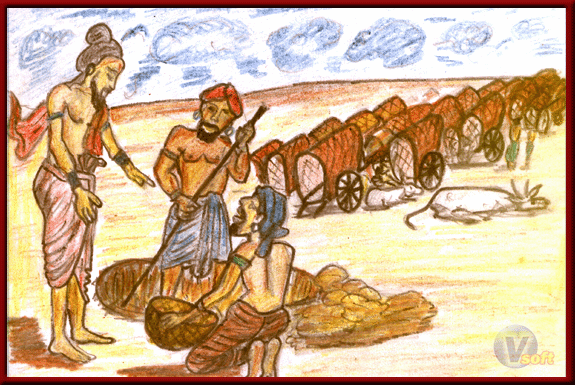98. The Bodhisatta – Desert Voyage

Once a time when Brahmadatta was king in Benares in Kasi the Bodhisatta was born into a trader’s family. When he was grown up, he used to travel about trading with 500 carts. On one occasion he came to a sandy wilderness sixty leagues across, the send of which was so fine that, when grasped, it slipped through the fingers of the closed fist. As soon as the sun got up, it grew as hot as a bed of charcoal-embers and nobody could walk upon it. Accordingly, those traversing it used to take fire-wood, water, oil, rice and so forth on their carts, and only trevelled by night. At dawn they used to range their carts in a circle to form a laager, with an – awning spread overhead, and after an early meal used to sit in the shade all the day long. When the sun went down, they had their evening meal; and, so soon as the ground became cool, they used to yoke their carts and move forward. Travelling on this desert was like voyaging over the sea; a ‘desert-pilot,’ as he was called, had to convoy them over by knowledge of the stars. And this was the way in which our merchant was now traveling that wilderness.
When he had only some seven more miles before him, he thought to himself, “To –night will see us out of this sandy wilderness.” So, after they had had their supper, he ordered the wood and water to be thrown away, and yoking his carts, set out on the road. In the front cart set the pilot upon a couch looking up to the stars in the heavens and directing the course thereby. But so long had he been without sleep that he was tired out and fell asleep, with the result that he did not mark that the oxen had turned round and were retracing their steps. All night the oxen kept on their way, but at dawn the pilot woke up, and, observing the disposition of the stars overhead, shouted out, “Turn the carts round! turn the carts round!” And as they turned the carts round and were forming them into line, the day broke. “Why? this is where we camped yesterday,” cried the people of the caravan. “All our wood and water is gone, and we are lost.” So saying, they unyoked their carts and made a laager and spread the awning overhead; then each man flung himself down in despair beneath his own cart. Thought the Brahmadatta to himself, “If I give in, every single one will perish.” So he ranged to and fro while it was still early and cool, until he came on a clump of kusa-grass. “This grass,” thought he “can only have grown up here thanks to the presence of water underneath.” So he ordered a spade to be brought and a hole to be dug at that spot. Sixty cubits down they dug, till at that depth the spade struck on a rock and everybody lost heart. But the Brahmadatta, feeling sure there must be water under that rock, descended into the hole and took his stand upon the rock. Stooping down, he applied his ear to it, and listened. Catching the sound of water flowing beneath, he came out and said to a serving-lad, “My boy, if you give in, we shall all perish. So gather your courage; Go down into the hole with this iron sledge-hammer, and strike the rock.”
Obedient to his master’s bidding, the lad, resolute where all others had lost heart, went down and struck the rock. The rock which had damped the stream, split. Up rose the water in the hole till it was as high as a palm-tree; and everybody drank and bathed. Then they chopped up their spare axles and yokes and other surplus gear, cooked their rice and ate it, and fed their oxen. And as soon as the sun set, they hoisted a flag by the said of the well and traveled on to their destination.
There they sold away their goods for twice and four times their value. With the proceeds they returned to their own home, where they lived out their term of life and in the end passed away. The Bodhisatta too after a life spent in charity and other good works, passed away likewise to fare according to his deserts.


Leave a Reply